

SUBSCRIBE TO OUR FREE NEWSLETTER
Daily news & progressive opinion—funded by the people, not the corporations—delivered straight to your inbox.
5
#000000
#FFFFFF
To donate by check, phone, or other method, see our More Ways to Give page.


Daily news & progressive opinion—funded by the people, not the corporations—delivered straight to your inbox.
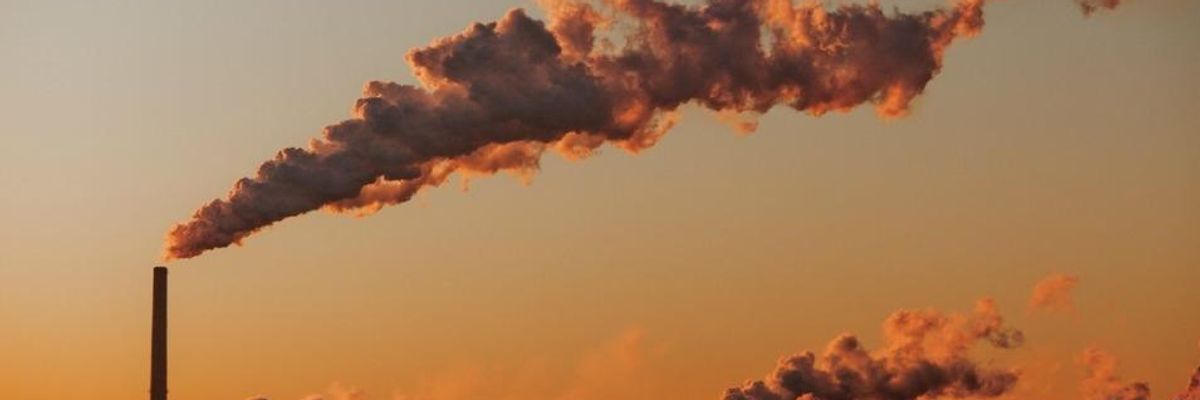
"The pandemic has laid bare entrenched inequality in the United States and those most vulnerable to Covid-19 are often those most at risk from pollution and climate change." (Photo: Kris Krug/flickr/cc)
On Monday, the Environmental Protection Agency declined to put in place stricter regulations on coal. This is despite the evolving evidence that air pollution is correlated with worse Covid-19 outcomes.
Ecological studies have shown that even a small increase in exposure to particulate matter of 1 ug/m3 (PM2.5) in the air leads to an 8% increase in Covid-related mortality. A study out of Yale yields similar findings that improved air quality during the quarantine period in China avoided a total of 8,911 NO2-related deaths, 65% of which were from cardiovascular diseases (hypertensive disease, coronary heart disease, and stroke) and chronic obstructive pulmonary disease (emphysema and bronchitis).
The urgency of improving public health could not be more obvious at the present moment where Covid-related deaths near a quarter million at the writing of this article. Yet the present administration has engaged nature in battle with a series of ill-advised policies targeting environmental protections from siding with fossil fuel industry to pulling out of the Paris agreement.
In April 2020, the Trump administration rolled back regulations on automobile emissions even though their own analysis Safer Affordable Fuel Efficient (SAFE) Vehicles Rule, issued by the EPA and the Department of Transportation, suggested there would be an increase in premature deaths between 444 and 1,000. In 2018, the White House weakened rules on carbon pollution from coal-fired power plants, a move which the EPA estimated (pdf) would cause an additional 1,400 premature deaths annually.
The administration is rolling back more than 100 environmental rules and regulations over four years, 27 of which involve air pollution and emissions. While the courts have overturned a handful of these, the assault on protections is left in place for the many with 84 rollbacks already completed (pdf).
The pandemic has laid bare entrenched inequality in the United States and those most vulnerable to Covid-19 are often those most at risk from pollution and climate change. Studies before the pandemic have shown the effect of pollution on pre-existing lung conditions. Communities already disenfranchised are bearing a disproportionate burden of the disease from exposure, comorbidities, and often from working as essential employees. Poor neighborhoods and communities of color are frequently exposed to higher levels of air pollution than more affluent communities.
Increasingly, people are voicing their concern. According to Associated Press exit polls from this year's election, 70% of Americans are concerned about the effects of the climate crisis.
Our hospitals are at capacity. Covid-19 is a public health emergency immediately and climate change is arguably the most consequential public health crisis of all time. Addressing emission standards, pollution, and environmental protections are not abstract chess moves that may or may not help at some point in the distant future. They are necessities now.
Trump and Musk are on an unconstitutional rampage, aiming for virtually every corner of the federal government. These two right-wing billionaires are targeting nurses, scientists, teachers, daycare providers, judges, veterans, air traffic controllers, and nuclear safety inspectors. No one is safe. The food stamps program, Social Security, Medicare, and Medicaid are next. It’s an unprecedented disaster and a five-alarm fire, but there will be a reckoning. The people did not vote for this. The American people do not want this dystopian hellscape that hides behind claims of “efficiency.” Still, in reality, it is all a giveaway to corporate interests and the libertarian dreams of far-right oligarchs like Musk. Common Dreams is playing a vital role by reporting day and night on this orgy of corruption and greed, as well as what everyday people can do to organize and fight back. As a people-powered nonprofit news outlet, we cover issues the corporate media never will, but we can only continue with our readers’ support. |
On Monday, the Environmental Protection Agency declined to put in place stricter regulations on coal. This is despite the evolving evidence that air pollution is correlated with worse Covid-19 outcomes.
Ecological studies have shown that even a small increase in exposure to particulate matter of 1 ug/m3 (PM2.5) in the air leads to an 8% increase in Covid-related mortality. A study out of Yale yields similar findings that improved air quality during the quarantine period in China avoided a total of 8,911 NO2-related deaths, 65% of which were from cardiovascular diseases (hypertensive disease, coronary heart disease, and stroke) and chronic obstructive pulmonary disease (emphysema and bronchitis).
The urgency of improving public health could not be more obvious at the present moment where Covid-related deaths near a quarter million at the writing of this article. Yet the present administration has engaged nature in battle with a series of ill-advised policies targeting environmental protections from siding with fossil fuel industry to pulling out of the Paris agreement.
In April 2020, the Trump administration rolled back regulations on automobile emissions even though their own analysis Safer Affordable Fuel Efficient (SAFE) Vehicles Rule, issued by the EPA and the Department of Transportation, suggested there would be an increase in premature deaths between 444 and 1,000. In 2018, the White House weakened rules on carbon pollution from coal-fired power plants, a move which the EPA estimated (pdf) would cause an additional 1,400 premature deaths annually.
The administration is rolling back more than 100 environmental rules and regulations over four years, 27 of which involve air pollution and emissions. While the courts have overturned a handful of these, the assault on protections is left in place for the many with 84 rollbacks already completed (pdf).
The pandemic has laid bare entrenched inequality in the United States and those most vulnerable to Covid-19 are often those most at risk from pollution and climate change. Studies before the pandemic have shown the effect of pollution on pre-existing lung conditions. Communities already disenfranchised are bearing a disproportionate burden of the disease from exposure, comorbidities, and often from working as essential employees. Poor neighborhoods and communities of color are frequently exposed to higher levels of air pollution than more affluent communities.
Increasingly, people are voicing their concern. According to Associated Press exit polls from this year's election, 70% of Americans are concerned about the effects of the climate crisis.
Our hospitals are at capacity. Covid-19 is a public health emergency immediately and climate change is arguably the most consequential public health crisis of all time. Addressing emission standards, pollution, and environmental protections are not abstract chess moves that may or may not help at some point in the distant future. They are necessities now.
On Monday, the Environmental Protection Agency declined to put in place stricter regulations on coal. This is despite the evolving evidence that air pollution is correlated with worse Covid-19 outcomes.
Ecological studies have shown that even a small increase in exposure to particulate matter of 1 ug/m3 (PM2.5) in the air leads to an 8% increase in Covid-related mortality. A study out of Yale yields similar findings that improved air quality during the quarantine period in China avoided a total of 8,911 NO2-related deaths, 65% of which were from cardiovascular diseases (hypertensive disease, coronary heart disease, and stroke) and chronic obstructive pulmonary disease (emphysema and bronchitis).
The urgency of improving public health could not be more obvious at the present moment where Covid-related deaths near a quarter million at the writing of this article. Yet the present administration has engaged nature in battle with a series of ill-advised policies targeting environmental protections from siding with fossil fuel industry to pulling out of the Paris agreement.
In April 2020, the Trump administration rolled back regulations on automobile emissions even though their own analysis Safer Affordable Fuel Efficient (SAFE) Vehicles Rule, issued by the EPA and the Department of Transportation, suggested there would be an increase in premature deaths between 444 and 1,000. In 2018, the White House weakened rules on carbon pollution from coal-fired power plants, a move which the EPA estimated (pdf) would cause an additional 1,400 premature deaths annually.
The administration is rolling back more than 100 environmental rules and regulations over four years, 27 of which involve air pollution and emissions. While the courts have overturned a handful of these, the assault on protections is left in place for the many with 84 rollbacks already completed (pdf).
The pandemic has laid bare entrenched inequality in the United States and those most vulnerable to Covid-19 are often those most at risk from pollution and climate change. Studies before the pandemic have shown the effect of pollution on pre-existing lung conditions. Communities already disenfranchised are bearing a disproportionate burden of the disease from exposure, comorbidities, and often from working as essential employees. Poor neighborhoods and communities of color are frequently exposed to higher levels of air pollution than more affluent communities.
Increasingly, people are voicing their concern. According to Associated Press exit polls from this year's election, 70% of Americans are concerned about the effects of the climate crisis.
Our hospitals are at capacity. Covid-19 is a public health emergency immediately and climate change is arguably the most consequential public health crisis of all time. Addressing emission standards, pollution, and environmental protections are not abstract chess moves that may or may not help at some point in the distant future. They are necessities now.
"Imagine if federal worker unions and Democratic Party officials showed up at the plant gate of a company that was about to close its doors," said one labor advocate recently. "Why aren't the Democrats doing this?"
Congressman Ro Khanna is raising the alarm about mass layoffs in the U.S. economy resulting from President Donald Trump's failed economic policies. Over 4,000 factory workers lost their jobs this week due to firings or plant closures.
On Thursday, automaker Stellantis, citing conditions created by Trump's tariffs, announced temporary layoffs for 900 workers, represented by the United Auto Workers (UAW). "The affected U.S. employees," reported CNN, "work at five different Midwest plants: the Warren Stamping and Sterling Stamping plants in Michigan, as well as the Indiana Transmission Plant, Kokomo Transmission Plant and Kokomo Casting Plant, all in Kokomo, Indiana."
In a social media thread on Saturday night, Rep. Ro Khanna (D-Calif.)—a lawmaker who has advocating loudly, including in books and in Congress, for an industrialization policy that would bring manufacturing jobs back to the United States—posted a litany of other layoffs announced recently as part of the economic devastation and chaos unleashed by Trump as well as conditions that reveal how vulnerable U.S. workers remain.
"This week," Khann wrote, "19 factories had mass layoffs, 15 closed, and 4,134 factory workers across America lost their jobs. Cleveland-Cliffs laid off 1,200 workers in Michigan and Minnesota as they deal with the impact of Trump's tariffs on steel and auto imports."
"We need jobs and currently at this time, the majority of the companies that we work with and represent our members at are not hiring." —Mark DePaoli, UAW
For union leaders representing those workers at Cleveland-Cliffs, they said "chaos" was the operative word. "Chaos. You know? A lot of questions. You've got a lot of people who worked there a long time that are potentially losing their job," Bill Wilhelm, a servicing representative and editor with UAW Local 600, told local ABC News affiliate WXYZ-Channel 7.
The United Auto Workers says the layoff fund set aside for those losing their jobs won't last long and find them new jobs of that quality will not be easy. "Our first concern will be to look around at all the companies where we have members and see if we can find jobs," said the local's 1st vice president, Mark DePaoli. "I mean, jobs are going to be the key. We need jobs and currently at this time, the majority of the companies that we work with and represent our members at are not hiring."
The pain of workers in families in Dearborn, as indicated by Khanna's thread, is just the tip of the iceberg. In post after post, he cataloged a stream of new layoffs impacting workers nationwide and across various sectors:
With public sector workers being fired in massive numbers nationwide due to the blitzkrieg unleashed by the Elon Musk-led Department of Government Efficiency, or DOGE, private sector workers are no strangers to mass layoffs within a U.S. economy dominated by corporate interests and union density still at historic lows.
Les Leopold, executive director of the Labor Institute who has been sounding the alarm for years about the devastation associated with mass layoffs, wrote recently about how the situation is even worse than he previously understood. On top of existing corporate greed and the stock buyback phenomena driving many of the mass layoffs in the private sector, Trump's mismanagement of tariff and trade policy is almost certain to make things worse, triggering more job losses in addition to higher costs on consumer goods.
In order to combat Trump, Leopold wrote last month, "Democrats should take a page from Trump and put job protection on the top of their agenda. As tariffs bite and cause job destruction, the Democrats should show up and support those laid-off workers."
Instead of simply calling Trump's tariffs "insane," which many rightly have, the Democrats "should call them job-killing tariffs," advised Leopold. "As prices rise, they can blame Trump for that as well."
With Trump's economic policies coming into full view, the picture is bleak for businesses large and small—and that means more pain for workers.
As Axios' Ben Berkowitz reported Saturday. "When everything gets more expensive everywhere because of tariffs, that starts a cycle for businesses, too — one that might end with layoffs, bankruptcies, and higher prices for the survivors' customers," he explained. "The cycle is just starting now, but the pain is immediate."
The "big picture," Berkowitz continued, is this:
The stock market is not the economy, but if you want a decent proxy for Main Street businesses, look at the Russell 2000, a broad measure of the stock market's small companies across industries.
—It's down almost 20% this year alone.
—That in and of itself doesn't make a business turn the lights off, but it says something about public confidence in their prospects.
—"The market is like a real time poll ... this is going to impact all businesses in one way or another undoubtedly," Ken Mahoney of Mahoney Asset Management wrote Friday.
In Sunday comments to Common Dreams, Leopold wanted to know where Khanna and other Democrats were last year when John Deere laid off a thousand workers.
"What do the progressive Democrats have to say about the tens of thousands of mass layoffs that take place each month? Radio silence," he said. "It would be useful if they had a policy that addressed Wall Street induced mass layoffs rather than just opposing tariffs, but I wouldn't bet on that."
On the question of silence and who, ultimately, will stand up for American workers—whether in the public or private sector—it's not clear who will emerge as a true defender or what forces would galvanize to truly represent the interests of the nation's working class.
"Imagine if federal worker unions and Democratic Party officials showed up at the plant gate of a company that was about to close its doors to finance hefty stock buybacks for its billionaire owners," Leopold wrote in early March. "A show of support for their fellow layoff victims and a unity message aimed at stopping billionaire job destruction would be simple to craft and easy to share. It would be news."
"Why aren't the Democrats doing this?" he asked.
"Thank you to the hundreds of thousands of Americans across the country who are standing up and speaking out for our voting rights, fundamental freedoms, and essential services like Social Security and Medicare."
In communities large and small across the United States on Saturday, hundreds of thousands of people collectively took to the streets to make their opposition to President Donald Trump heard.
The people who took part in the organized protests ranged from very young children to the elderly and their message was scrawled on signs of all sizes and colors—many of them angry, some of them funny, but all in line with the "Hands Off" message that brought them together.
"Thank you to the hundreds of thousands of Americans across the country who are standing up and speaking out for our voting rights, fundamental freedoms, and essential services like Social Security and Medicare," said the group Stand Up America as word of the turnout poured in from across the country.
A relatively small, but representative sample of photographs from various demonstrations that took place follows.
Demonstrators gather on Boston Common, cheering and chanting slogans, during the nationwide "Hands Off!" protest against US President Donald Trump and his advisor, Tesla CEO Elon Musk, in Boston, Massachusetts on April 5, 2025. (Photo by Joseph Prezioso / AFP)
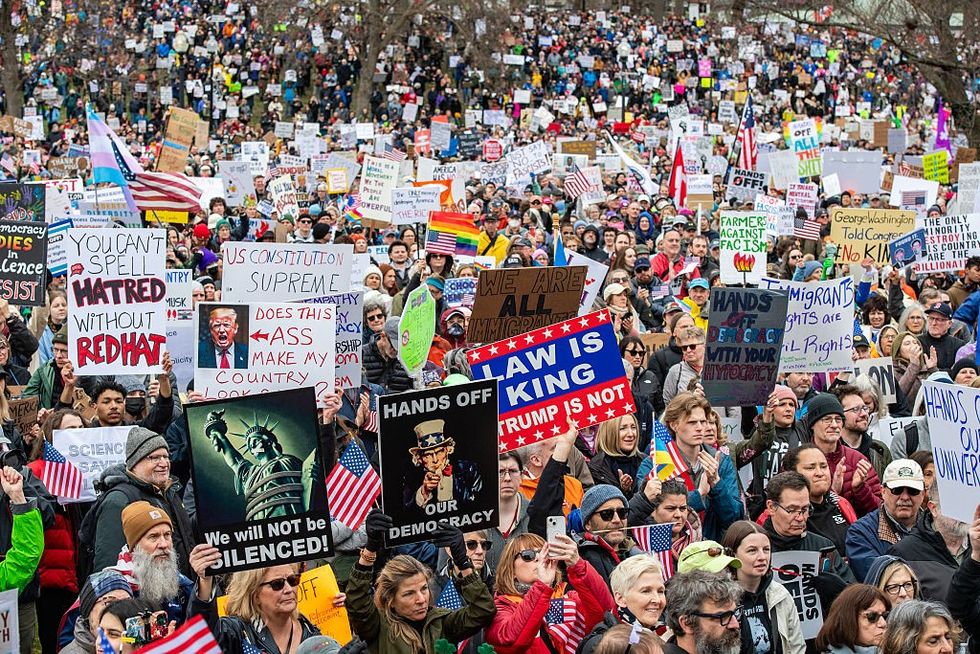
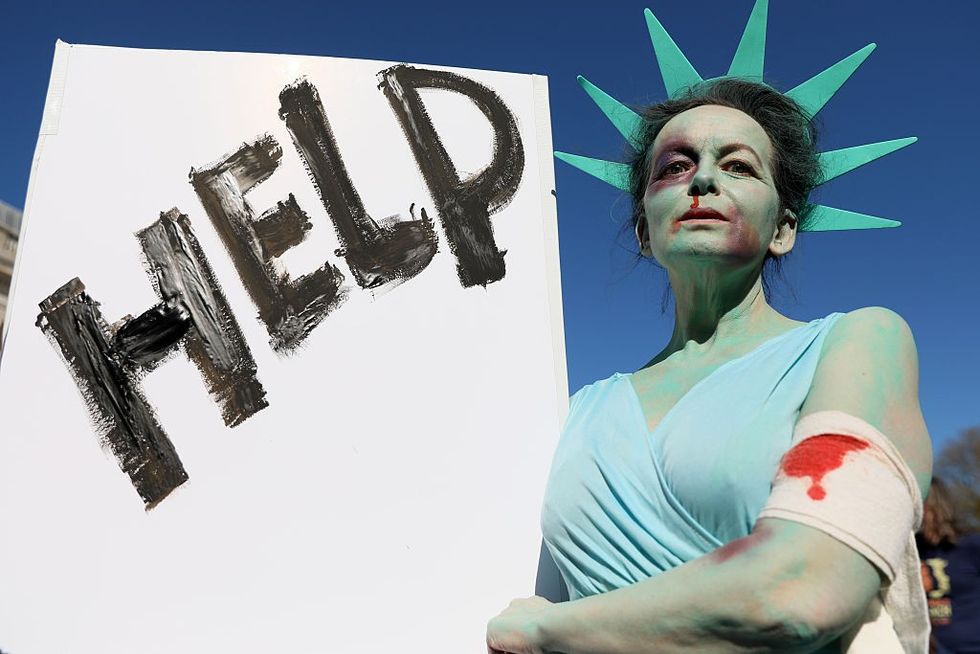
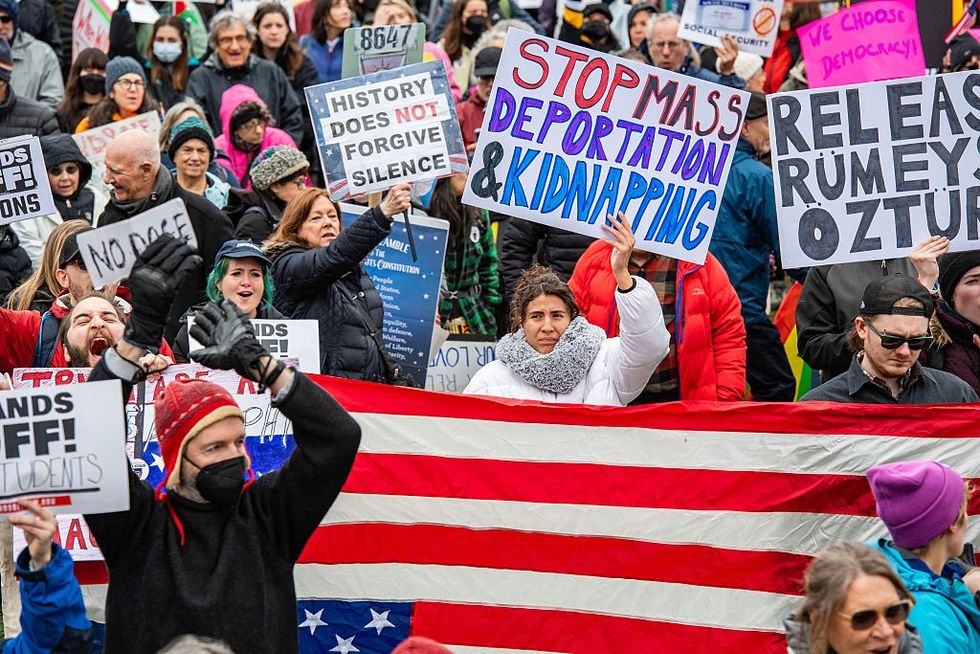
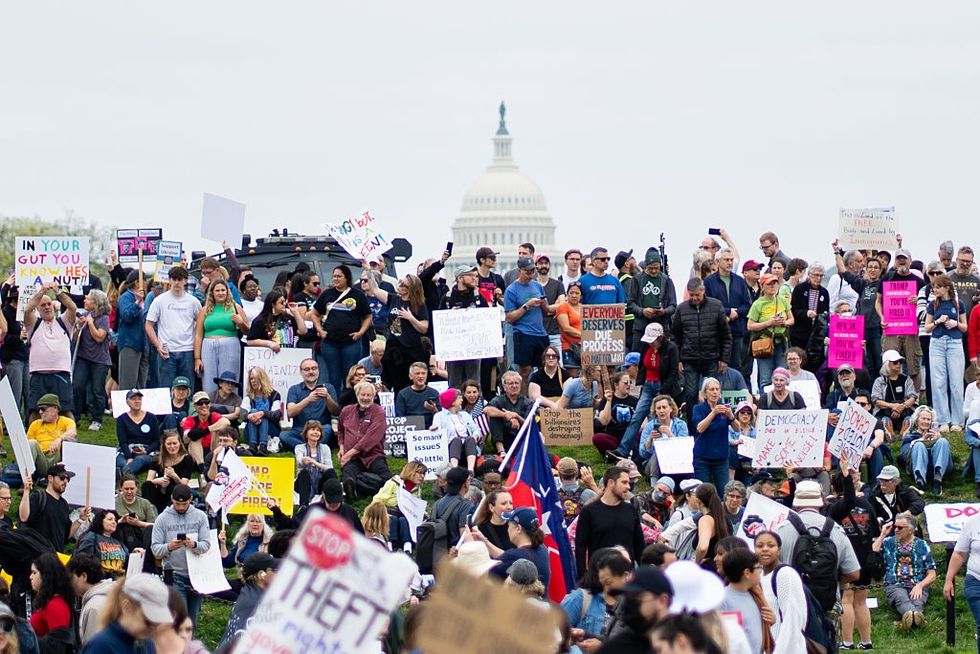
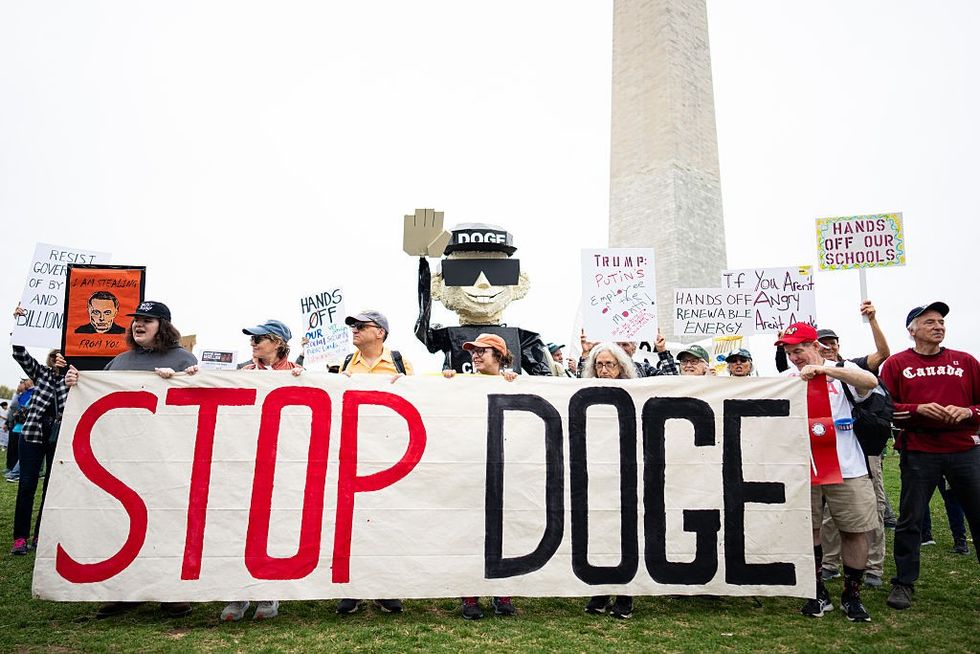
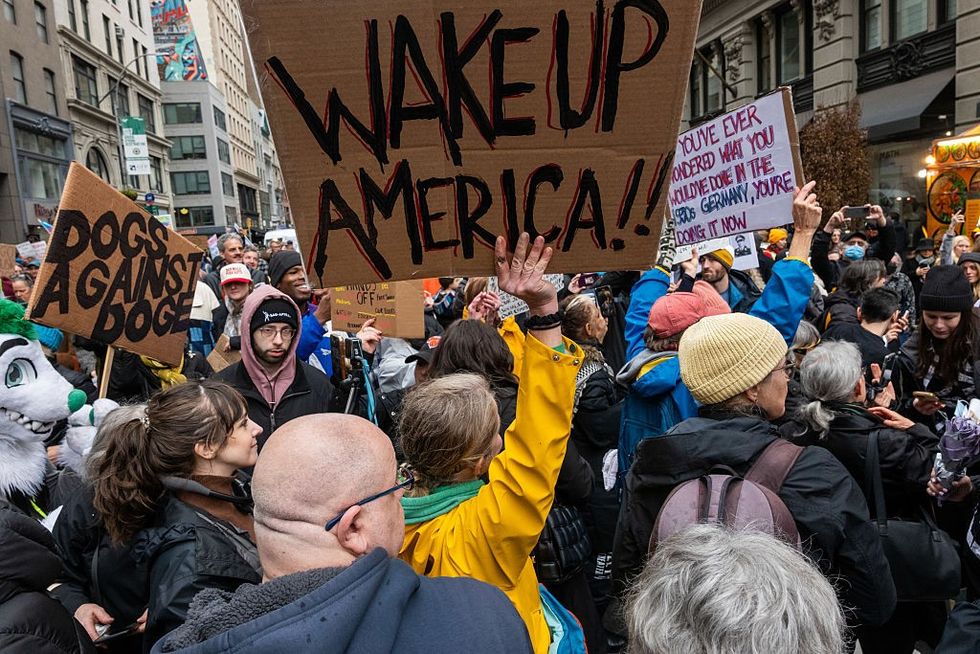
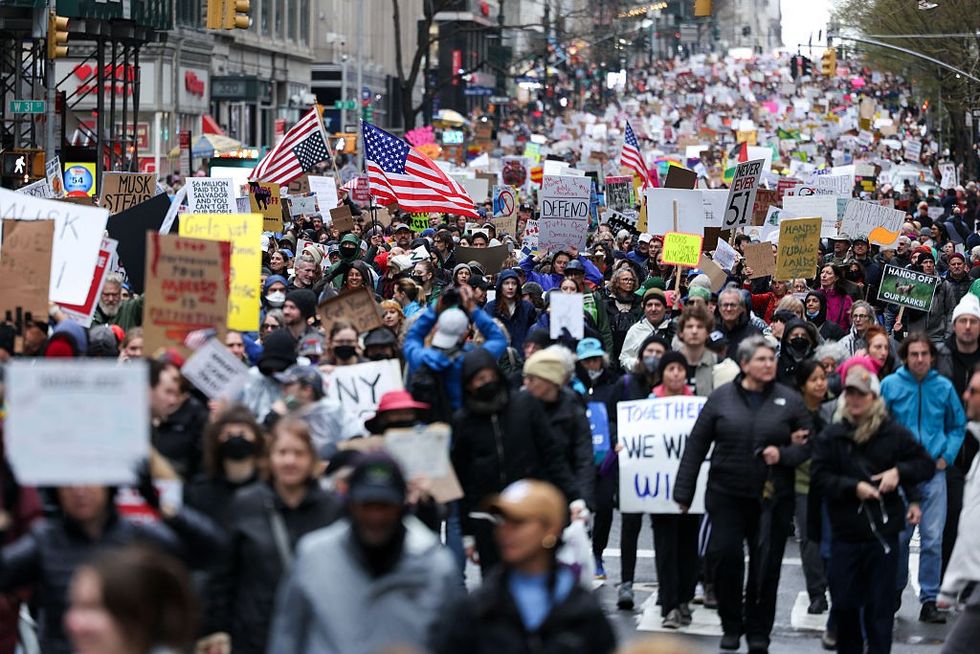
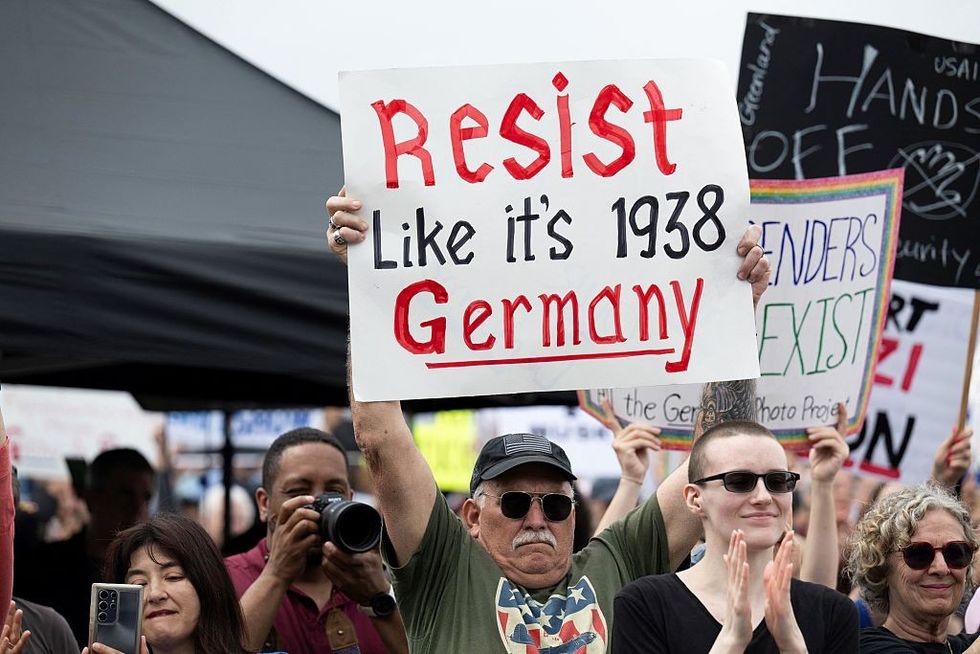
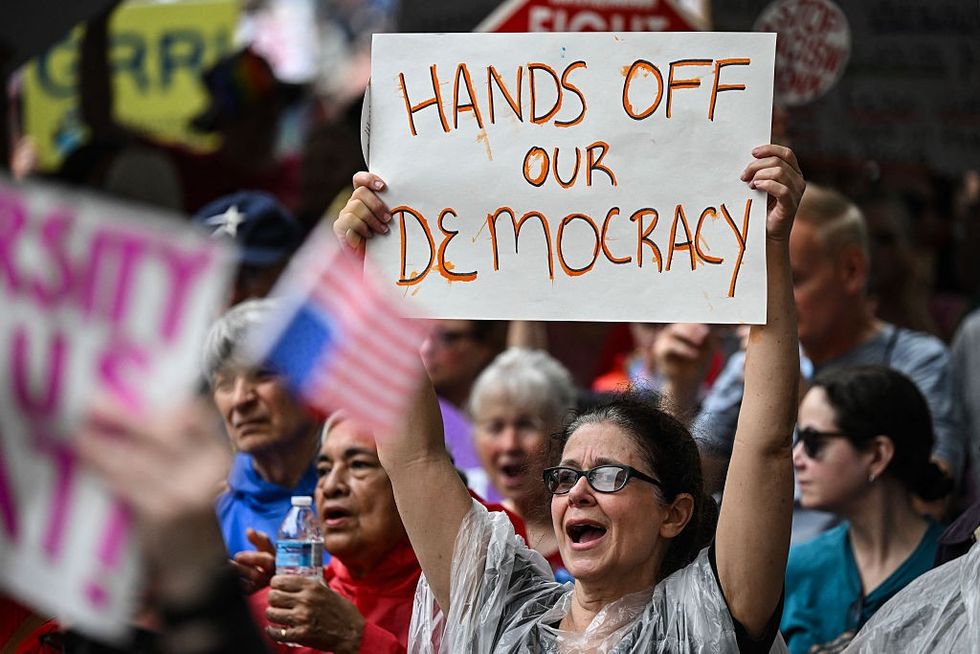
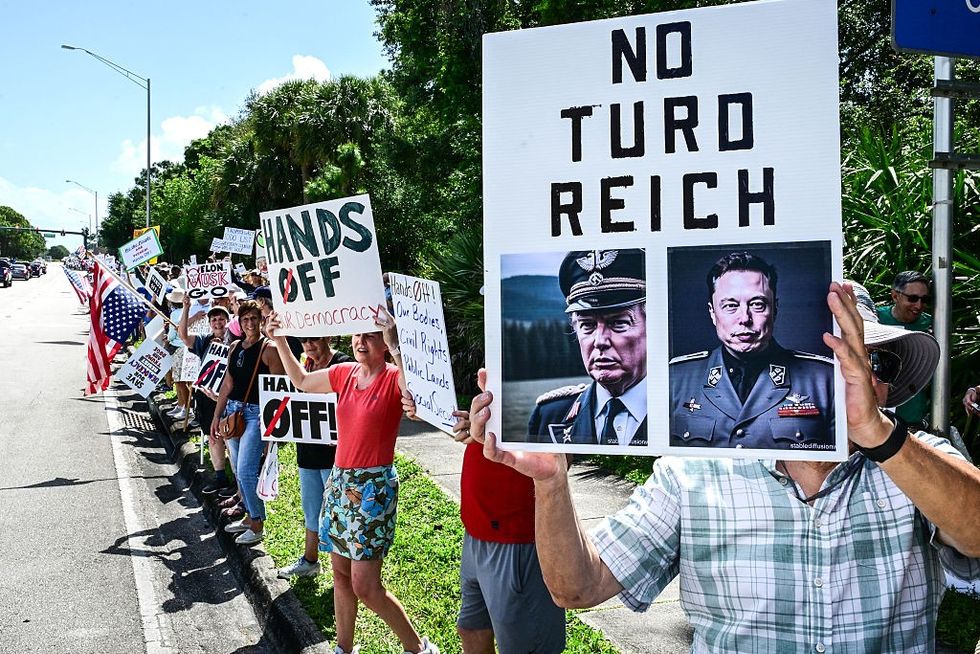
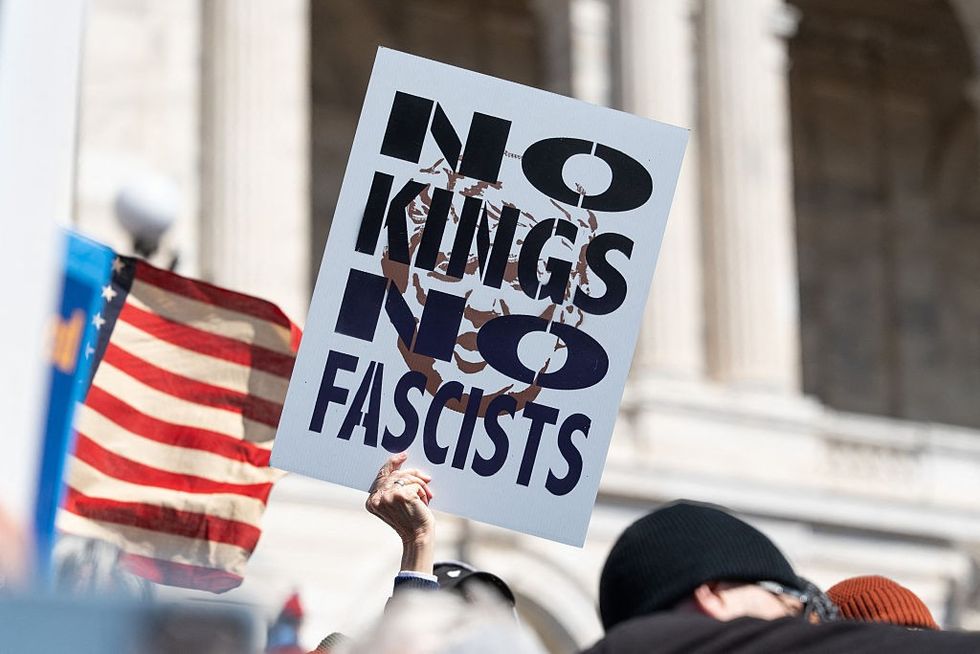
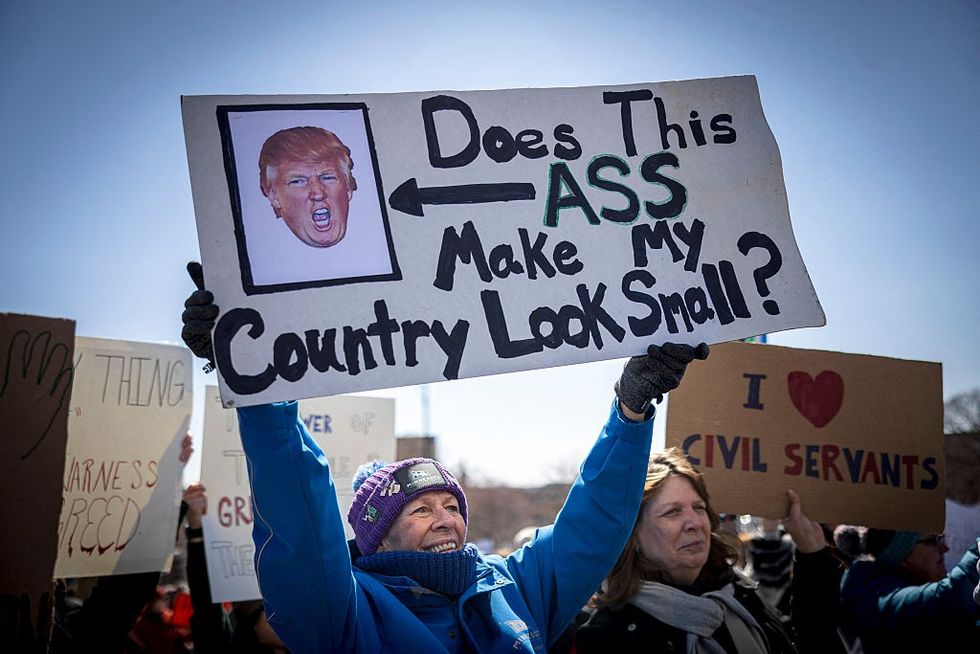
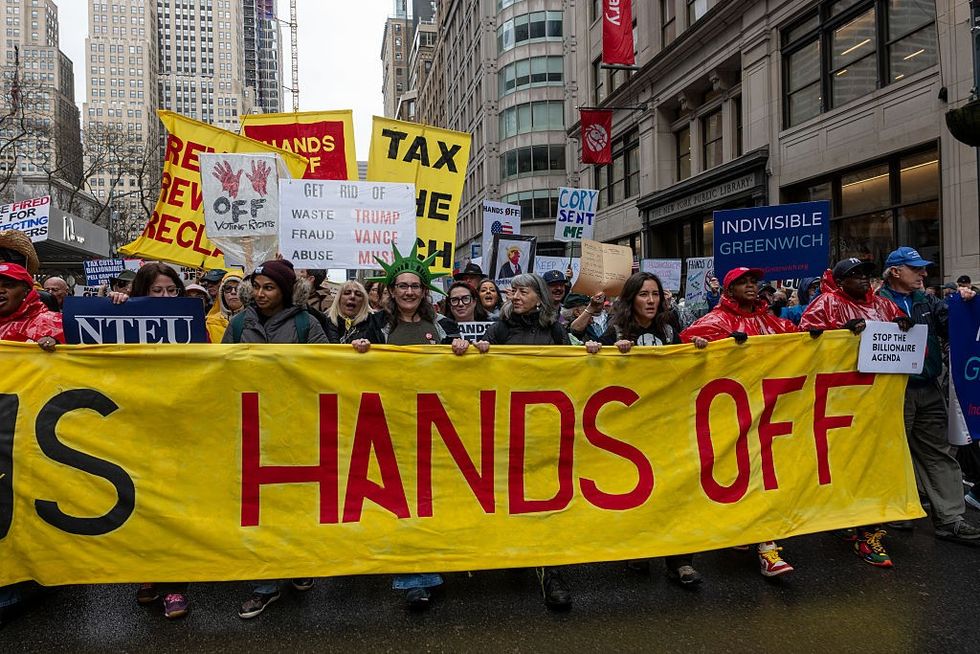
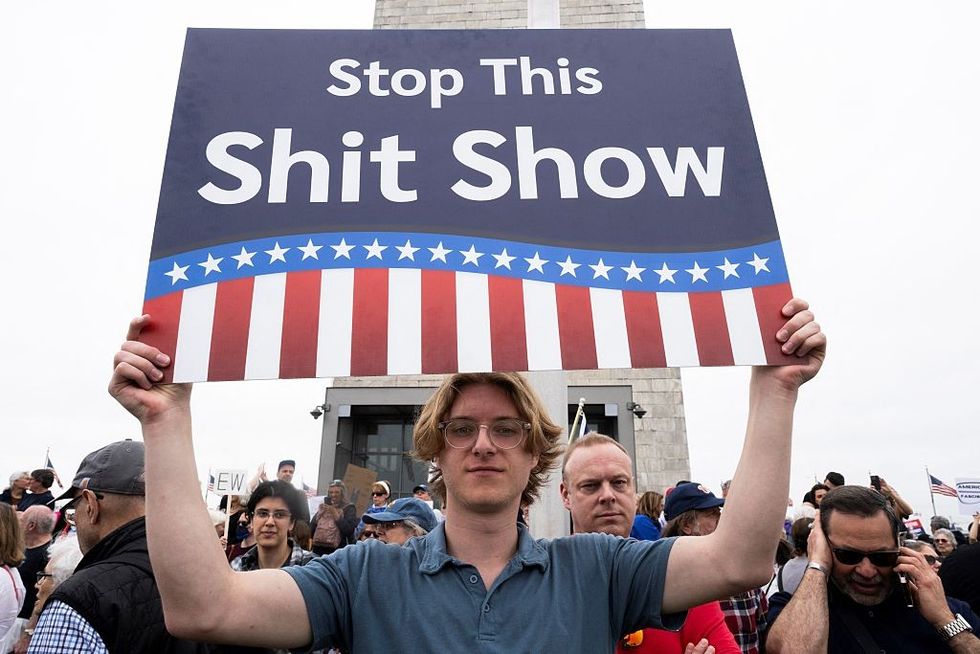
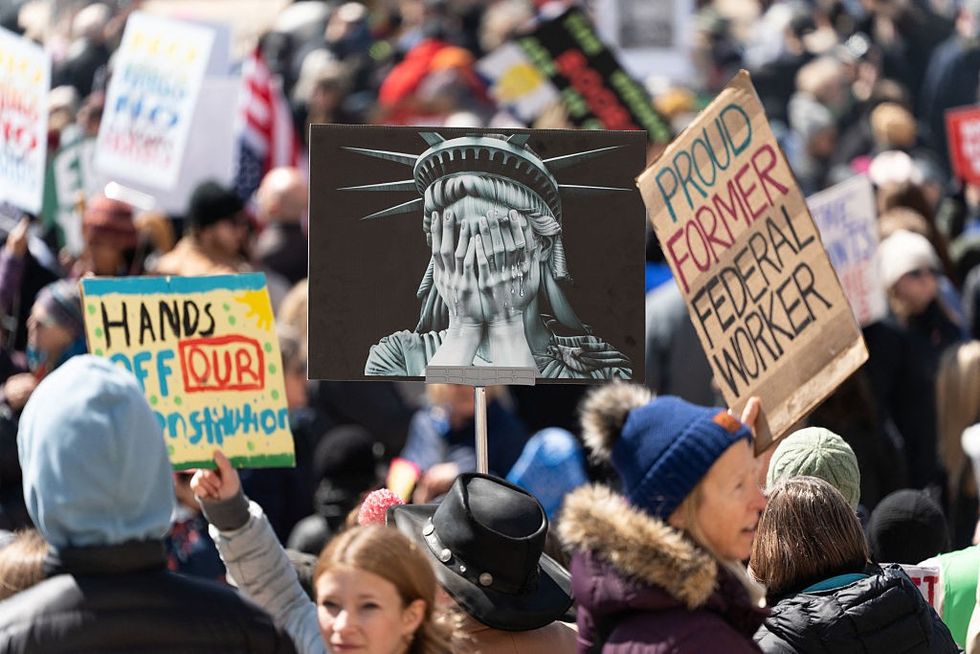
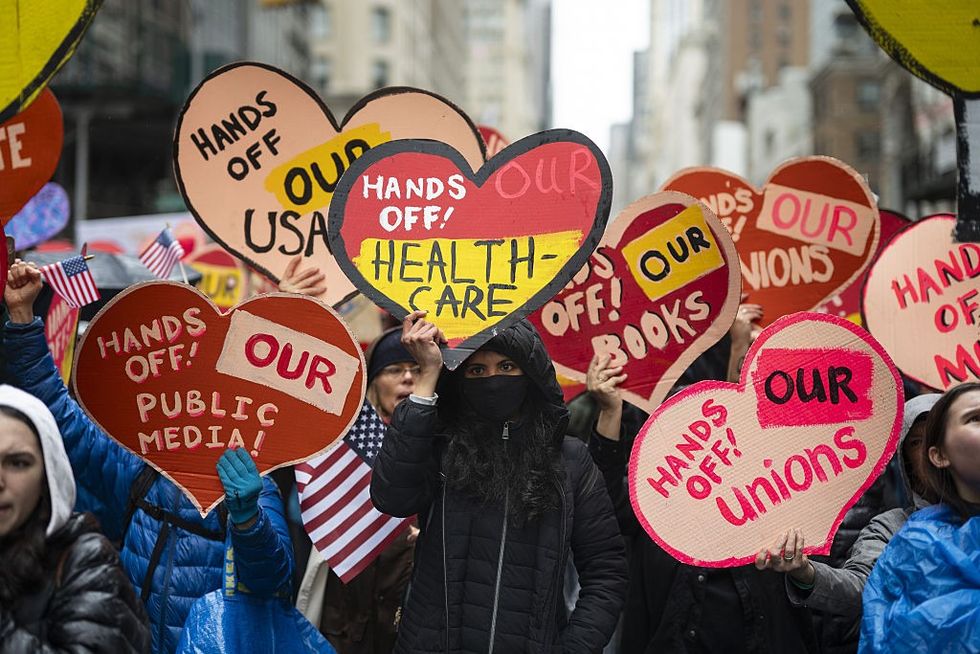
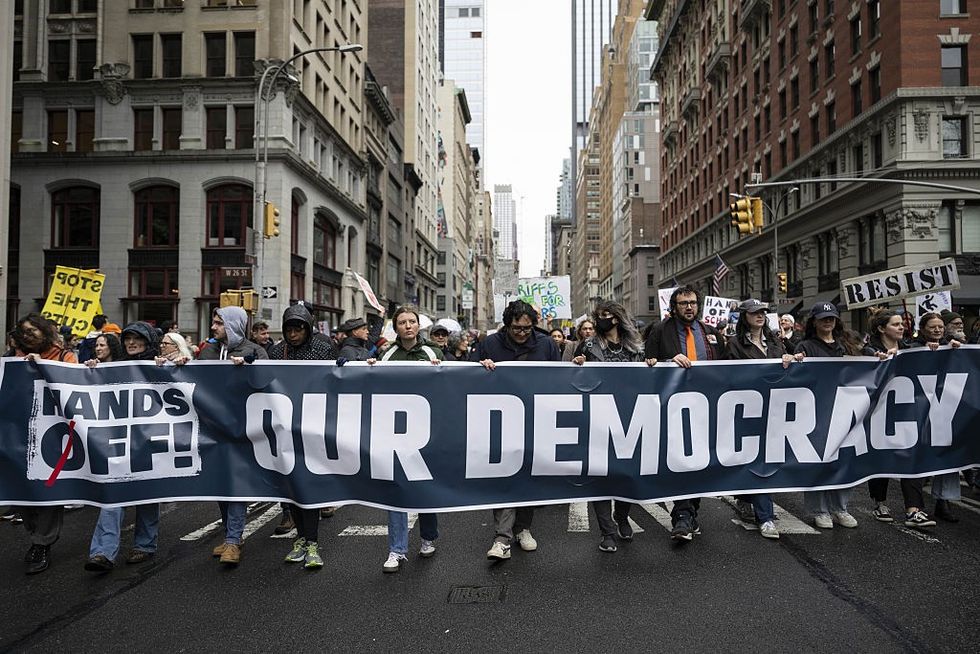
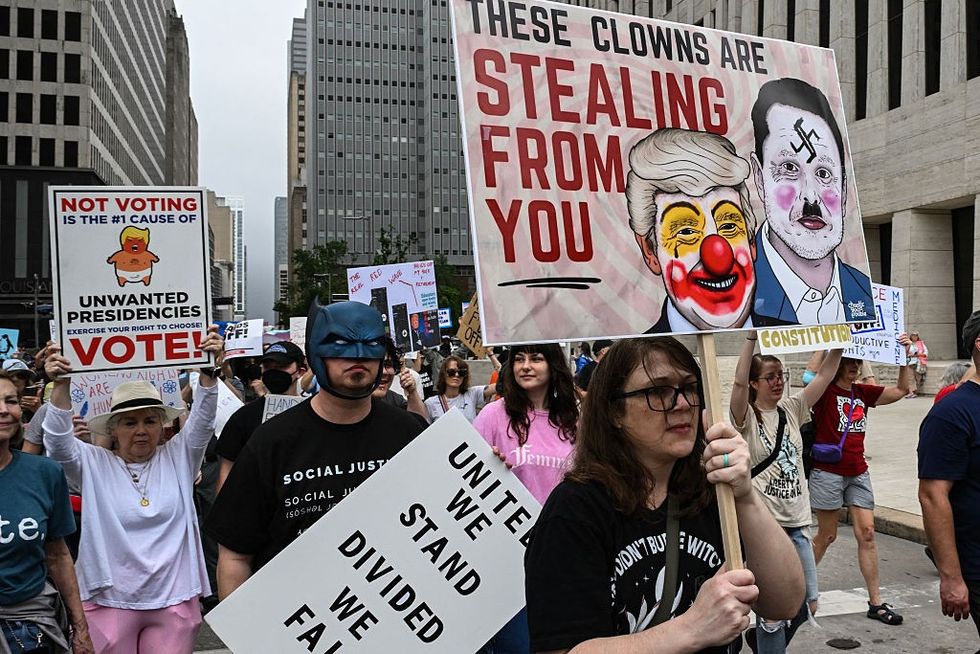
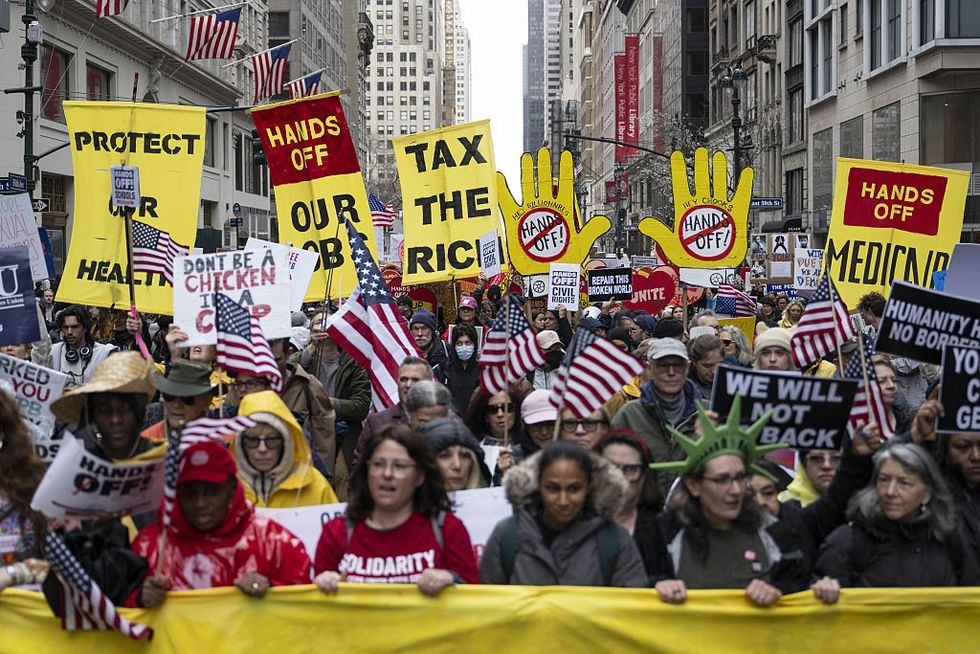
"Everyone involved in this crime against humanity, and everyone who covered it up, would face prosecution in a world that had any shred of dignity left."
A video presented to officials at the United Nations on Friday and first made public Saturday by the New York Times provides more evidence that the recent massacre of Palestinian medics in Gaza did not happen the way Israeli government claimed—the latest in a long line of deception when it comes to violence against civilians that have led to repeated accusations of war crimes.
The video, according to the Palestine Red Crescent Society (PRCS), was found on the phone of a paramedic found in a mass grave with a bullet in his head after being killed, along with seven other medics, by Israeli forces on March 23. The eight medics, buried in the shallow grave with the bodies riddled with bullets, were: Mustafa Khafaja, Ezz El-Din Shaat, Saleh Muammar, Refaat Radwan, Muhammad Bahloul, Ashraf Abu Libda, Muhammad Al-Hila, and Raed Al-Sharif. The video reportedly belonged to Radwan. A ninth medic, identified as Asaad Al-Nasasra, who was at the scene of the massacre, which took place near the southern city of Rafah, is still missing.
The PRCS said it presented the video—which refutes the explanation of the killings offered by Israeli officials—to members of the UN Security Council on Friday.
"They were killed in their uniforms. Driving their clearly marked vehicles. Wearing their gloves. On their way to save lives," Jonathan Whittall, head of the UN's humanitarian affairs office in Palestine, said last week after the bodies were discovered. Some of the victims, according to Gaza officials, were found with handcuffs still on them and appeared to have been shot in the head, execution-style.
The Israeli military initially said its soldiers "did not randomly attack" any ambulances, but rather claimed they fired on "terrorists" who approached them in "suspicious vehicles." Lt. Col. Nadav Shoshani, an IDF spokesperson, said the vehicles that the soldiers opened fire on were driving with their lights off and did not have clearance to be in the area. The video evidence directly contradicts the IDF's version of events.
As the Times reports:
The Times obtained the video from a senior diplomat at the United Nations who asked not to be identified to be able to share sensitive information.
The Times verified the location and timing of the video, which was taken in the southern city of Rafah early on March 23. Filmed from what appears to be the front interior of a moving vehicle, it shows a convoy of ambulances and a fire truck, clearly marked, with headlights and flashing lights turned on, driving south on a road to the north of Rafah in the early morning. The first rays of sun can be seen, and birds are chirping.
In an interview with Drop Site News published Friday, the only known paramedic to survive the attack, Munther Abed, explained that he and his colleagues "were directly and deliberately shot at" by the IDF. "The car is clearly marked with 'Palestinian Red Crescent Society 101.' The car's number was clear and the crews' uniform was clear, so why were we directly shot at? That is the question."
The video's release sparked fresh outrage and demands for accountability on Saturday.
"The IDF denied access to the site for days; they sent in diggers to cover up the massacre and intentionally lied about it," said podcast producer Hamza M. Syed in reaction to the new revelations. "The entire leadership of the Israeli army is implicated in this unconscionable war crime. And they must be prosecuted."
"Everyone involved in this crime against humanity, and everyone who covered it up, would face prosecution in a world that had any shred of dignity left," said journalist Ryan Grim of DropSite News.